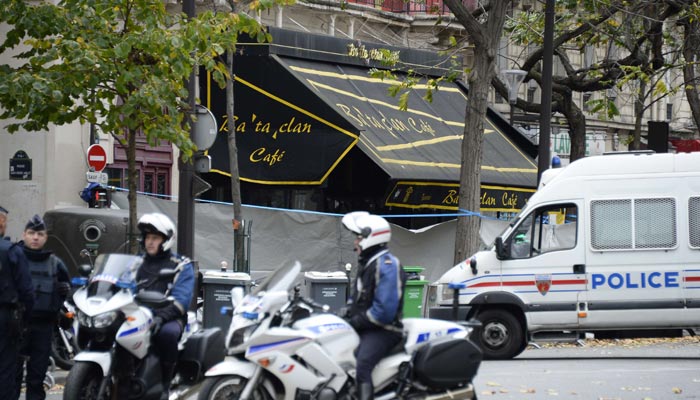Police stand guard at the cordoned off crime scene of the Bataclan concert hall in Paris on Monday.
AFP/Paris
France staged pre-dawn raids on dozens of suspected Islamists and bombed Islamic State's stronghold in Syria as the prime minister steeled the nation on Monday for more bloodshed after its deadliest ever terror attacks.
As France prepared to observe a minute's silence in honour of the at least 129 people killed in Friday's bloodbath, police conducted "several dozen" raids across the country, uncovering in one case "an arsenal of weapons."
Police found a rocket launcher and weapons in the southeastern city of Lyon as the manhunt for at least one "dangerous" suspect intensified.
French prosecutors said they had identified two more attackers involved in the assault, including one previously charged in a "terrorist" case.
The 28-year-old Samy Amimour was involved in the massacre of 89 people in the Bataclan concert hall, they said.
The second was carrying a Syrian passport in the name of Ahmad al-Mohammad, although authorities said the authenticity of the document had yet to be verified.
Addressing a grieving nation, Prime Minister Manuel Valls warned that more attacks could be yet to come.
"We know that operations were being prepared and are still being prepared, not only against France but other European countries too," he told RTL radio.
Valls said Friday's attacks were "planned from Syria", where French planes bombed the stronghold of the Islamic State jihadists, the jihadist group that has claimed responsibility for Friday's carnage.
'Planned in Belgium'
Residents of Paris tried to pick up their daily lives, despite the national state of emergency that remains in place.
Pupils went back to school and museums that had been closed over the weekend were set to re-open later in the day in the world's most-visited city.
Metro trains were full of commuters and the streets were noticeably livelier than at the weekend.
Attention was also turning to Belgium after French Interior Minister Bernard Cazeneuve said the attacks were "prepared abroad and involved a team situated in Belgian territory and who may have benefited from... complicity in France."
French authorities released a photograph of 26-year-old Salah Abdeslam, a suspect also wanted in Belgium.
Abdeslam is one of three brothers linked to the slaughter and lived in Brussels, in the rundown immigrant neighbourhood of Molenbeek, where police have made several arrests.
Seven of the gunmen and suicide bombers were killed in the attacks, but prosecutors have said they believe three teams were involved, suggesting some suspects are on the run, possibly in Belgium.
Seven of the gunmen and suicide bombers died in the bloodshed, with three blowing themselves up outside the Stade de France as France and Germany were playing an international football friendly.
Three heavily-armed gunmen wearing explosives vests opened fire on crowds enjoying a Friday night out at cafes and at the Bataclan concert hall, where 89 people were killed as they watched a gig by American group Eagles of Death Metal.
In a further sign of the growing Belgian connection, investigators said two cars used in the violence were hired there.
One was found near the Bataclan venue, and the other in the suburb of Montreuil east of Paris, with a number of AK47 rifles inside.
Minute's silence
In an outpouring of solidarity, vigils were held across the globe over the weekend, and in many capitals, buildings and monuments were illuminated in the red, white and blue of the French flag.
In Rome the lights of the Trevi Fountain and the Colosseum were turned off Sunday night in a silent tribute.
And in a striking gesture, the great pyramid in Egypt was bathed in French, Lebanese and Russian colours in homage to the victims in Paris as well as those in the Beirut bombings, and the Sinai plane crash.
The European Union has called on all member states to observe the minute's silence at midday and in the US, the Stars and Stripes will fly at half-mast at the White House until sunset Thursday.
President Francois Hollande will observe the silence at the Sorbonne University, in recognition of the large number of young people among the 129 dead. Another 352 were injured, scores of them seriously.
The worst terror attack in French history comes less than 11 months after jihadists struck satirical magazine Charlie Hebdo and a Jewish supermarket, killing 17.
After Hollande promised a "merciless" response to the attacks, French jets hit an IS command post, a recruitment centre, a munitions depot and a "terrorist" training camp in Raqa late on Sunday, the defence ministry said.
The operation was co-ordinated with US forces by a dozen aircraft which took off from Jordan and the United Arab Emirates.
Islamic State claimed it had attacked Paris in revenge for the French campaign of air strikes in Syria and threatened further violence in France "as long as it continues its Crusader campaign".
The prime minister said authorities have so far identified 103 of the dead, who included journalists, lawyers, students, parents of small children. Most are under 40.
More than 25 foreigners from over a dozen countries were among the victims.
The first attacker to be named by investigators was Omar Ismail Mostefai, a 29-year-old French citizen, who was identified from a severed finger found among the carnage at the Bataclan.
Meanwhile, the discovery of a Syrian passport near the body of one suicide attacker has raised fears that some of the assailants might have entered Europe as part of the huge influx of people fleeing Syria's civil war.
Greek and Serbian authorities have confirmed the passport was issued to a man who registered as a refugee in October on the island of Leros and applied for asylum in Serbia a few days later.
World leaders on Sunday denounced terrorism at a heavily guarded G20 summit in Turkey and observed a minute's silence for those killed.

